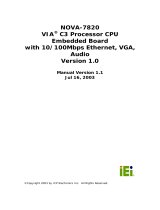Page is loading ...

■
Fully supports the IEEE 1284 EPP interface
standard
■
IBM PC parallel port compatible
■
Software configurable base address
■
Software configurable interrupt
■
Memory only interface supported
■
Five year warranty
■
RoHS compatible
Many portable and hand-held computers do not provide
a parallel port. When they do, the built-in port often
cannot function in EPP mode. Quatech’s SPP-100 is
an ideal choice in these situations when a high speed
parallel interface is required.
For example, the SPP-100 is currently being used in
several portable medical applications to provide EEG and
EKG tests to patients in remote areas who would
otherwise need to travel hours to reach the nearest
hospital. It is used as part of a real-time scoring system
for stock-car racing, and as an interface for an electronic
sewing machine. Of course, the most common use is to
provide a high-speed printer port when one is not
provided by the PC.
Quatech’s SPP-100 fully supports the IEEE 1284 EPP
standard, and functions exactly like a computer’s native
parallel port. Thus, unlike the many USB to parallel
converters on the market, Quatech’s SPP-100 will work
seamlessly with any hardware or software that requires
either an EPP or standard parallel port.
EPP/Parallel
PCMCIA
Card
www.quatech.com
Add a high-speed EPP parallel port to any PCMCIA-
enabled laptop, handheld, or desktop computer.

SPP-100 Specifications
Bus Interface: 16-bit PCMCIA, Release 8 and backward compliant
OS Support: Windows 95/98/Me/NT/2000/XP/Vista
Windows CE (see web for device compatibility)
Linux (standard modes only)
OS/2
HP Palmtop
Data Rate: 700 kbps (max)*
* Actual baud rates can be affected by cabling and other factors
Ports: 1 Parallel Port
Modes: EPP Mode
Standard Unidirectional Parallel Port Mode
Standard Bidirectional Parallel Port Mode
Interrupt Levels: IRQ 3-7, IRQ 9-12, IRQ 14, IRQ 15
Power Requirements: 35 mA @ +5 V, 25 mA @ +3.3 V
Certifications: CE, FCC Class B, RoHS and WEEE Compliant
www.quatech.com
February 2007
Made in USA [email protected]
Connector: Standard DSUB-25 connector via included pigtail
cable off the card as follows:
PIN 1: STROBE
PIN 2: D0
PIN 3: D1
PIN 4: D2
PIN 5: D3
PIN 6: D4
PIN 7: D5
PIN 8: D6
PIN 9: D7
PIN 10: ACK
PIN 11: BUSY
PIN 12: PERROR
PIN 13: SELECTIN
PIN 14: AUTOFEED
PIN 15: NFAULT
PIN 16: INT
PIN 17: SELECT
PIN 18: GND
PIN 19: GND
PIN 20: GND
PIN 21: GND
PIN 22: GND
PIN 23: GND
PIN 24: GND
PIN 25: GND
Ordering Information:
SPP-100: EPP PCMCIA card with DB25 female cable
/
